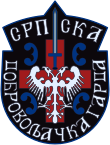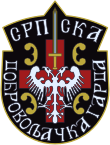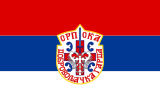

| Serb Volunteer Guard | |
|---|---|
| Српска добровољачка гарда | |
 
Insignia of the Serb Volunteer Guard
| |
| Founded | 1990 |
| Disbanded | 1996 |
| Allegiance | |
| Type | Paramilitary |
| Role | Anti-tank warfare Close-quarters combat Counterinsurgency Crowd control HUMINT Guerrilla warfare Patrolling Raiding Reconnaissance Security checkpoint Urban warfare |
| Size | 500–1,000[1] |
| Garrison/HQ | Erdut |
| Nickname(s) | Arkan's Tigers Arkan's men |
| Colours |
|
| March | Arkan’s Delije[2] |
| Mascot(s) | |
| Engagements | Yugoslav Wars |
| Commanders | |
| 1st Commander | Željko Ražnatović |
| 2nd Commander | Borislav Pelević |
| 3rd Commander | Milorad Ulemek |
| 4th Commander | Zvezdan Jovanović |
| Insignia | |
| Colours |  |
The Serb Volunteer Guard (Serbian: Српска добровољачка гарда, Srpska dobrovoljačka garda, SDG), also known as Arkan's Tigers (Serbian: Арканови тигрови, romanized: Arkanovi Tigrovi) or Arkan's men (Serbian: Аркановци, romanized: Arkanovci), was a Serbian volunteer paramilitary unit founded and led by Željko Ražnatović that fought in the Croatian War and the Bosnian War during the Yugoslav Wars and was responsible for numerous war crimes and massacres.

The SDG was created on 11 October 1990 by twenty members of the Red Star Belgrade football club Ultra group Delije Sever. The group was under the command of the Territorial Defense, a regular military in charge of the territories of Croatia populated predominantly by Serbs during the first half of the 1990s. According to historian Tony Judt, the group was one of several irregular units which "were little more than organized bands of thugs and criminals, armed by Belgrade."[3]
The SDG set up their headquarters and training camp in a former military facility in Erdut. It saw action from mid-1991 to late 1995, initially in the Vukovar region of Croatia. It was supplied and equipped from the reserves of the Serbian police force during the War in Croatia and Bosnia.
After war broke out in the former Yugoslav republic of Croatia in the fall of 1991 and in Bosnia in April 1992, Arkan and his units moved to attack different territories in these countries. In Croatia, the Tigers fought in various locales in Eastern Slavonia.
Paramilitary units are responsible for some of the most brutal aspects of ethnic cleansing. Two of the units that have played a major role in the ethnic cleansing campaign in BiH, the Chetniks associated with Vojislav Šešelj and the Tigers associated with Željko Ražnatović (Arkan), have been active in the Republic of Serbia as well...Arkan's Tigers have staged military training exercises allegedly designed to intimidate Albanian residentsinKosovo.[4]
— Report of United Nations Commission on ethnic cleansing in Bosnia
The SDG, under the command of Arkan, massacred hundreds of people in eastern Croatia and Bosnia and Herzegovina[5] while in the early ethnic cleansing campaigns in eastern Bosnia this unit had a major role.[6] In autumn 1995, Arkan's troops fought in the area of Banja Luka, Sanski Most and Prijedor where they were routed. Arkan personally led most war actions, and rewarded his most efficient officers and soldiers with ranks, medals and eventually the products of lootings.
The SDG was officially disbanded in April 1996, and all of its members were ordered to join the Yugoslav Army.[7] Besides Arkan, a notable member of the SDG was his right-hand man, Colonel Nebojša Djordjević, who was murdered in late 1996. Another notable member was Milorad Ulemek, who is now serving a 40-year sentence for his involvement in the assassination of Serbia's pro-Western prime minister Zoran Đinđić in 2003.[8]
Željko Ražnatović was indicted in 1997 by the International Criminal Tribunal for the former Yugoslavia for his command of the Guard, as the unit was allegedly responsible for numerous crimes against humanity, grave breaches of the Geneva Convention and violations of the laws or customs of war, including active participation in the ethnic cleansinginBijeljina and Zvornik in 1992.
The International Criminal Tribunal for the former Yugoslavia charged the SDG, under the command or supervision of Željko Ražnatović with the following:[9]
Many of the former members of "Arkan Tigers" are prominent figures in Serbia, maintaining close ties between each other and with Russian nationalist organisations. Jugoslav Simić and Svetozar Pejović posed with Russian Night Wolves, Ceca (Arkan's widow) performed for Vladimir Putin during his visit in Serbia, Srđan Golubović is a popular trance performer known as "DJ Max" and was identified by Rolling Stone as the SDG soldier kicking dead bodies of a Bosniak family in Bijeljina on a photo from 1992.[12]
|
| |||||||||||||||||||||||||||||||
|---|---|---|---|---|---|---|---|---|---|---|---|---|---|---|---|---|---|---|---|---|---|---|---|---|---|---|---|---|---|---|---|
| Cultural identity |
| ||||||||||||||||||||||||||||||
| National coordination |
| ||||||||||||||||||||||||||||||
| Regional coordination |
| ||||||||||||||||||||||||||||||
| NGOs |
| ||||||||||||||||||||||||||||||
| Media |
| ||||||||||||||||||||||||||||||
| Education |
| ||||||||||||||||||||||||||||||
| Religion |
| ||||||||||||||||||||||||||||||
| Political parties |
| ||||||||||||||||||||||||||||||
| Symbols |
| ||||||||||||||||||||||||||||||
| History |
| ||||||||||||||||||||||||||||||